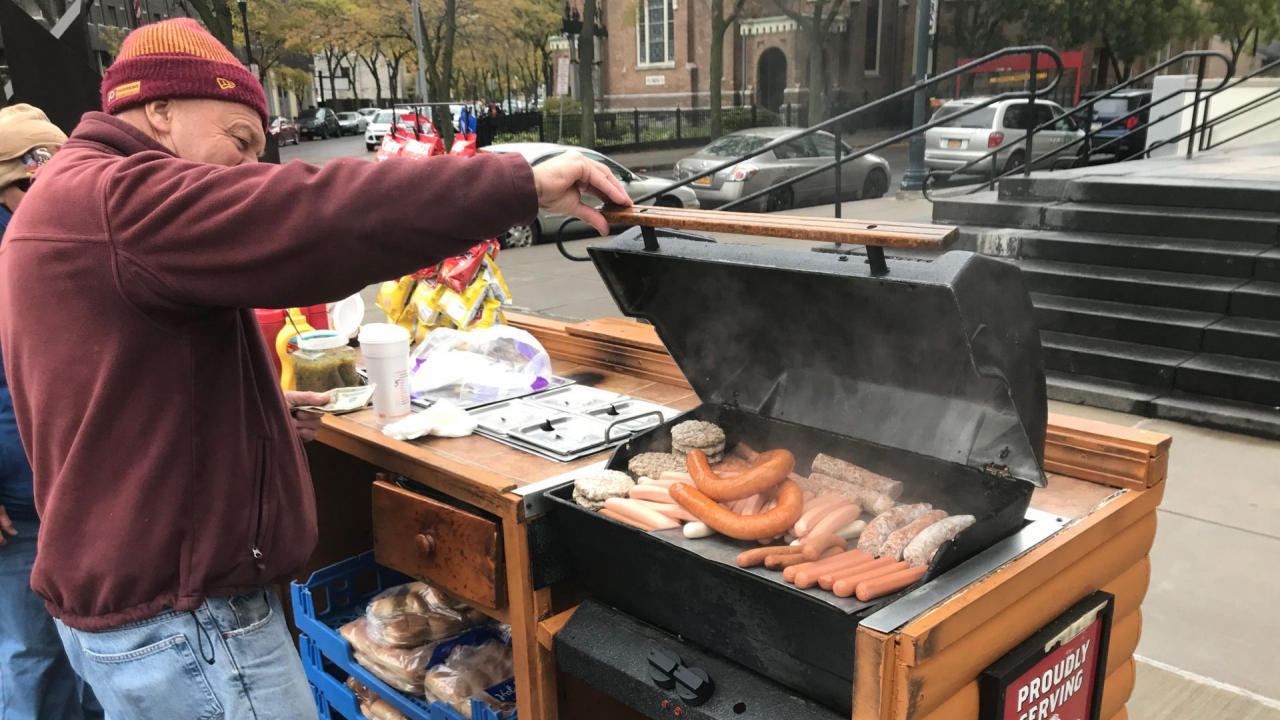
By Dan Harty SYRACUSE, N.Y. (NCC News) — Tall Paul’s The Dog Cabin is the last food cart still open in Syracuse this fall.
“Those other guys…they get soft,” owner Paul Waleski said with a laugh.
Waleski is a staple in downtown Syracuse and has been offering his selection of hot dogs, sausages, and hamburgers to the hungry lunch crowd for 25 years. This week, Waleski has been braving chilly October days to make as much money as he can before winter rolls in.
“I have to stay open as long as I can to pay that high fee,” said Waleski.
The high fee Waleski referred to is the annual $1,500 license charge that food cart owners must pay to vend in Syracuse.
Before this week, food truck owners owed the same amount. However, after the Syracuse Common Council approved councilor Michael Greene’s proposition to reduce the food truck license fee from $1,500 to $500 earlier this week, food cart operators were left wondering why they were not included.

On Wednesday, Greene held a meeting at the Common Council’s office to address the concerns of food cart owners. After the discussion, Greene said he believes the higher fee is still in place for a reason.
“If you look at the map right now of the allowable locations for the carts, those are premium locations in downtown,” Greene said. “They are much better than the map for the food trucks. So, it makes sense that they should be paying a little bit better for those locations. The other thing about the trucks is that they do not have reserved spots under the current ordinance. They have to fight for parking like any car that is downtown. The carts get a guaranteed spot and that’s worth something as well.”
Waleski, who has been the most vocal food cart owner on the current policy, spoke with Greene on Wednesday. Despite the better locations, Waleski thinks the logistics of running a food cart warrant the same price cut the trucks were awarded.
“We take up a way smaller space,” Waleski said. “And it’s hard to get set up every day because you have to unload everything, all your foodstuffs, your cart, your coolers for soda, the whole thing. And at the end of the day you have to break it back down, put it all back in. It takes time.”
On behalf of other owners, Waleski voiced a secondary concern about of the food cart lottery. If a vendor is one of the first picks in the lottery, he or she has the opportunity to pick from a greater number of locations. Therefore, a vendor can lose his or her spot from the previous year if they are unlucky in the lottery. Waleski insisted that cart operators who have been established at certain locations should be guaranteed that spot the next year to keep their customer base.
“We shouldn’t have to worry about [being moved] every year,” Waleski said. “It’s our livelihood.”
Greene said he will keep in contact with local food carts as he reviews the policies.
“I think it might end up being something where we lower the fees,” said Greene. “We’ll look at the process of the lottery to see if that can be approved upon as well.”




